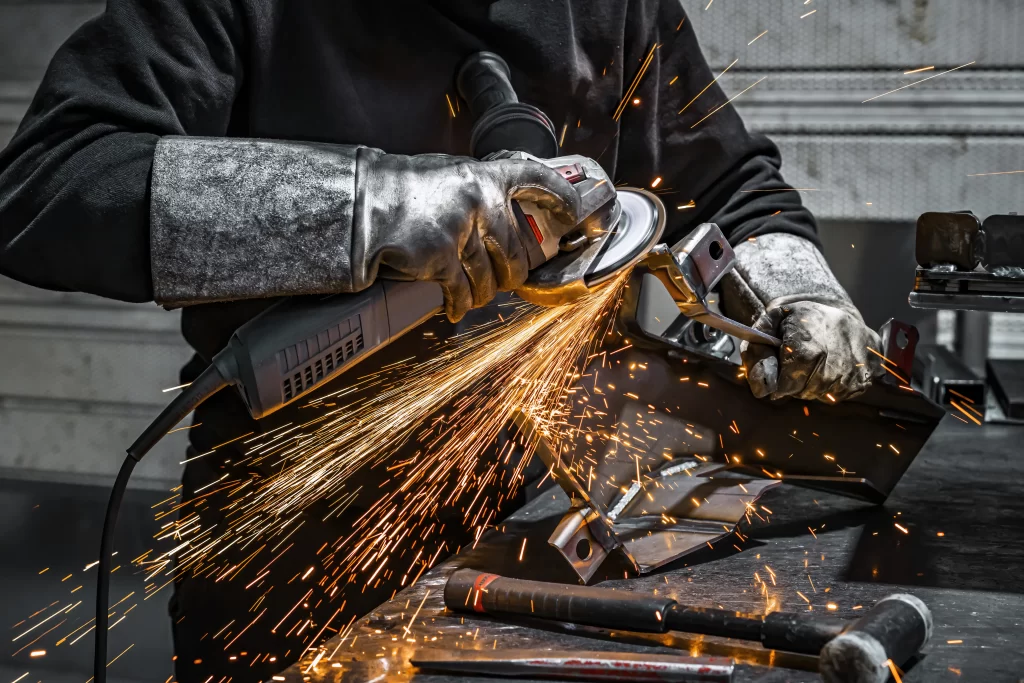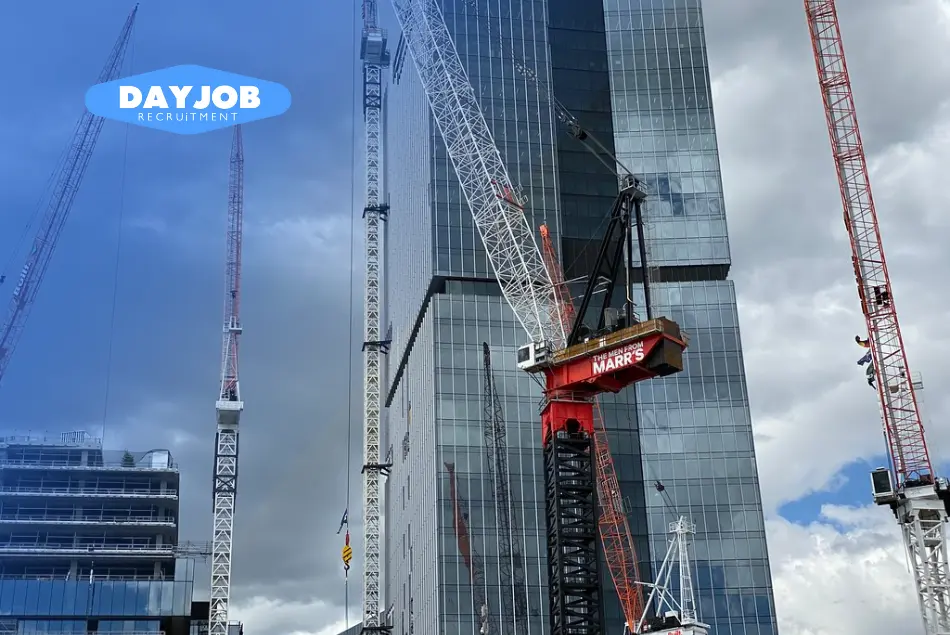In the heart of Australia’s construction evolution, the role of the boilermaker stands out as pivotal. As the Land Down Under witnesses a construction boom, specialized trades, especially boilermakers, are carving a niche for themselves. Their expertise and skills are shaping the nation’s skyline and infrastructure.
So, what does a boilermaker do in Australia? Read on to learn more about Boilermakers and its role in Australia’s construction industry.

What is a Boilermaker?
A boilermaker is a tradesperson who assembles, installs, maintains, and repairs boilers, closed vats, and other large vessels or containers that hold liquids and gases.
Boilermakers play a crucial role in the construction industry, specializing in the fabrication and installation of steel structures, including boilers, pressure vessels, tanks, and other heavy metal components. With the increasing demand for boilermaker jobs, they have become integral in the creation of metal structures that are pivotal in various sectors.
They possess a diverse skill set that encompasses welding, cutting, shaping, and assembling metal pieces to create these structures, making them invaluable in the fabrication trade. However, as technology advanced and industrial processes evolved, the role of boilermakers expanded beyond just boilers.
Today, they are involved in a wide range of projects that require their expertise in working with heavy metals. This includes constructing and repairing pressure vessels used in chemical plants, oil refineries, and other industrial facilities, especially within the oil and gas industry.
What Does a Boilermaker Do: A Day-to-Day Tasks of a Boilermaker in Australia

Image Source: freepik
Boilermakers engage in a variety of tasks that can vary depending on their specific job assignment and the project they are working on. However, some common day-to-day responsibilities include:
- Assembling Boilers and Other Containers: This involves reading blueprints and assembling parts, either manually or with hoists and cranes, to construct boilers and vessels.
- Installing Boilers and Vessels: After assembly, boilermakers must install these structures, which can include tasks such as positioning, aligning, and securing them in place.
- Maintenance and Repair Work: Regular maintenance is crucial for the longevity and safety of boilers and vessels. Boilermakers inspect structures for leaks or defects and perform necessary repairs, which may involve replacing or fixing parts.
- Testing and Inspection: Ensuring that boilers and vessels operate efficiently and safely is a critical part of a boilermaker’s job. They may perform tests using various tools and equipment to measure pressure levels, identify leaks, and ensure compliance with safety standards.
The Role of a Boilermaker in the Australian Construction Industry

1. Reading Blueprints and Technical Drawings
Boilermakers begin their work by studying detailed blueprints and technical drawings. These documents provide them with the necessary information about the dimensions, specifications, and materials required for the construction project.
As key players in the construction industry, they ensure that structures, especially those used in the manufacturing industry, are built to precise standards. By carefully analyzing these plans, boilermakers can accurately fabricate and assemble the steel structures.
As the demand for boilermaker jobs increases, those in the profession need to be adept at understanding these intricate details to ensure the precision of metal structures.
2. Fabrication of Steel Structures
Beyond fabrication, boilermakers also play a crucial role in the maintenance and repair of boilers. These boilers, often integral to many industrial processes, require regular checks and repairs to function efficiently. Boilermakers ensure the integrity of boiler furnaces, ensuring they operate safely and efficiently.
Once they have a clear understanding of the project requirements, boilermakers proceed with the fabrication process. Armed with a Certificate III and knowledge of various welding methods, they are well-equipped to handle the challenges of the trade.
This is a crucial step in the fabrication trade, where they are responsible for cutting, shaping, and welding metal plates and pipes to create the desired components. They use a variety of tools and equipment, such as plasma cutters, shears, bending machines, and welding machines, to shape and join the metal pieces together. The expertise and skills of a boilermaker are paramount in ensuring the quality and durability of these metal structures.
3. Welding and Joining Metal Components
Welding is a fundamental skill for boilermakers. They use different welding techniques, such as arc welding, gas welding, or TIG welding, to join metal components securely. This ensures that the structures they create are strong and able to withstand high pressures and extreme conditions.
Boilermakers must have a deep understanding of various welding processes and be proficient in executing them accurately.
4. Bolting and Assembling Structures
In addition to welding, boilermakers also use bolts and other fasteners to assemble steel structures. They carefully position and align the components according to the specifications provided in the blueprints.
By using precise measurements and following strict guidelines, they ensure that all connections are secure and stable.
Is your company ready to find the right talent?
What are the Roles of Boilermakers in the Over-all Boiler Construction Industry?

1. Infrastructure Projects
Australia’s construction industry is experiencing a significant boom, particularly in cities like Melbourne and Sydney. These cities are witnessing a surge in infrastructure projects, including the construction of new buildings, bridges, roads, and tunnels.
As a result, there is a growing demand for skilled boilermakers who can contribute to the successful completion of these projects.
2. Building Safety and Durability
Boilermakers play a crucial role in ensuring that buildings are not only aesthetically pleasing but also safe and durable. Their expertise in assembling and installing boilers and steel structures ensures that these components can withstand the test of time and extreme weather conditions.
With the increasing focus on building safety regulations, the demand for qualified boilermakers has risen to ensure compliance with these standards.
3. Maintenance and Repair
In addition to new construction projects, there is also a need for boilermakers, especially experienced boilermakers, in the maintenance and repair sector. Existing buildings and infrastructure require regular inspections, maintenance, and occasional repairs to ensure their continued functionality and safety.
A significant aspect of this maintenance involves hot water boilers which, given the extreme heat they operate under, necessitate a professional eye to ensure they are functioning correctly.
Boilermakers are often called upon to assess the condition of boilers and steel structures, identify any issues or defects, and carry out necessary repairs or replacements. The boilermaker job not only involves inspections but also the use of robotic welding techniques and hand tools for repair or installation purposes.
Once the repairs or installations are completed, it’s imperative to test the completed boilers to ensure they are operating safely and efficiently.
4. Shortage of Skilled Boilermakers
Despite the increasing demand for boilermakers in Australia’s construction boom, there is a shortage of skilled professionals in this field. This shortage can be attributed to various factors, including an aging workforce, lack of training opportunities, and limited awareness about the career prospects in this trade. As a result, there are ample job opportunities for individuals interested in pursuing a career as a boilermaker.
5. Competitive Salaries and Career Growth
The high demand for boilermakers, such as repair boilers, in Australia’s construction industry has led to competitive salaries and excellent career growth prospects. Skilled boilermakers can expect to earn attractive remuneration packages, especially if they possess additional certifications or specialized skills.
What Are the Necessary Qualifications and Training of Boilermakers?

General Qualifications for Boilermakers
To become a boilermaker in Australia, individuals typically need to complete a three to four-year apprenticeship.
During this apprenticeship, individuals are required to complete a Certificate III in Engineering – Fabrication Trade (MEM30319) which provides structured learning and workplace experience.
Certifications
In Australia, to work as a boilermaker, one typically needs to acquire formal qualifications and complete an apprenticeship. The primary certifications mentioned across different sources include a Certificate III or IV in Engineering, particularly focusing on Fabrication Trade or Boilermaking.
Boilermaker jobs often involve working in the construction industry, where they fabricate and repair boilers, work in confined spaces, and handle various metal components.
Here are the certifications and steps needed to become a boilermaker in Australia:
Certificate III in Engineering – Fabrication Trade (MEM30319)
This certification is often acquired as part of an apprenticeship, which usually spans three to four years. The apprenticeship provides structured learning at a registered training organisation along with workplace experience, which is crucial for gaining practical skills in the field.
During this period, apprentices learn to use both hand tools and power tools effectively. They might also get exposure to projects in water treatment plants and other industrial settings where boilermakers play a pivotal role.
Certificate IV in Engineering (Boilermaking) (MEM40119)
This is a nationally recognised engineering trade qualification that can be pursued post-school to become a qualified boilermaker.
An experienced boilermaker often has this certification, showcasing their expertise in the fabrication trade. They are skilled in assembling, installing, and testing completed boilers to ensure they function correctly.
Boiler Operation Licensing
For boilermakers who will work with boilers, a license to operate a standard boiler is necessary. This license covers boiler start-up, handover, monitoring, shutdown, and storage, and aligns with the Model Work Health and Safety (WHS) Regulations, and High Risk Work licensing requirements.
Those in the boilermaker’s job need to have this license, especially if they are responsible for the maintenance and operation of boilers.
Construction Induction Card (White Card)
In Australia, individuals working in the construction industry are required to complete a training course titled ‘Prepare to work safely in the construction industry’ to obtain a Construction Induction Card, commonly known as a White Card. This card is necessary for individuals to work on a construction site.
Working at Heights and High Risk Work license
The Occupational Safety and Health Regulations 1996 for Western Australia mentions requirements concerning working at heights and high-risk work licenses. Individuals involved in construction work that requires working at heights or entails high-risk tasks would need appropriate licenses or training.
High Risk Work License
According to Safe Work Australia, high risk work licenses are required for certain types of work, including operating boilers, which is a task potentially associated with boilermaker roles.
Advanced Qualifications
- Boilermakers may also pursue a Certificate IV in Engineering (Fabrication Trade), a four-year course covering a range of metalworking skills including robotic welding using computer-controlled equipment.
Recognition Process for Overseas Trained Boilermakers
- Overseas-trained boilermakers need to go through a recognition process which includes obtaining an Offshore Technical Skills Record (OTSR), a provisional license, Australian context gap training, an Australian VET Qualification, and finally, an Australian occupational license.
Discover your ideal job match!
Boilermaker Career Opportunities Across Industries
Boilermaker career opportunities span a wide range of industries, reflecting the diverse skills and applications of the trade. Boilermakers are specialized tradespeople who fabricate, install, and repair vessels or containers that hold liquids or gases, such as boilers, tanks, and vats.
The following are some key sectors and opportunities where boilermakers can find employment:
| Sector | Opportunities |
|---|---|
| Construction and Infrastructure | – Construction of buildings, bridges, and infrastructure projects. – Fabrication and installation of large steel structures. |
| Manufacturing | – Work in plants producing industrial equipment, vehicles, or machinery. – Custom fabrication for automotive, aerospace, and other industries. |
| Energy Sector | – Construction and maintenance of storage tanks and pressure vessels in renewable energy sectors (wind, solar). – Maintenance and repair in oil, gas, and coal sectors, especially in refineries and power plants. |
| Shipbuilding and Marine Engineering | – Building and repairing commercial and naval ships. |
| Mining and Resources | – Maintenance and repair of mining equipment. – Fabrication and repair of storage and processing tanks for minerals and chemicals. |
| Maintenance and Repair | – Regular inspection and repair of boilers and pressure vessels. – Emergency repair services requiring travel to different sites. |
| Education and Training | – Teaching roles in technical schools or apprenticeship programs, sharing knowledge with the next generation. |
| Self-Employment | – Starting a business to offer fabrication, repair, and maintenance services. |
Career Advancement Opportunities
- With experience, boilermakers can advance to supervisory and management positions, overseeing projects and teams.
- Specialization in a niche area, such as underwater welding for marine repairs or high-pressure welding in the energy sector, can lead to higher-paying opportunities.
Trends Affecting Boilermaker Careers
- Technological advancements in welding and fabrication are changing the skill set required for boilermakers, with a growing emphasis on automation and precision engineering.
- The global shift towards renewable energy and sustainable practices is creating new opportunities in industries that were not traditionally employers of boilermakers.
Employment Outlook
According to the U.S. Bureau of Labor Statistics (BLS), the median annual wage for boilermakers was $66,920 in May 2022. However, employment in this field is projected to decline by 4% from 2022 to 2032, with the decline attributed to fluctuations in the industries that employ boilermakers. Despite this projected decline, there will still be a need to replace workers who retire or move to other occupations, leading to an average of 1,100 job openings each year over the decade.
What Is the Basic Salary of a Boilermaker in Australia?

Embarking on a career as a boilermaker in Australia? The financial aspect is undoubtedly a crucial factor to consider. The salary figures, however, fluctuate and are subject to variables such as geographical location, experience level, and the employing company.
Here’s a breakdown of what the earnings look like according to different sources:
- Annual Salary Overview – The average annual salary for a boilermaker stands at AU$70,500, with a potential range between $70k to $130k per year.
- Hourly Wage Insights – The hourly wage vary significantly across different companies. While Indeed lists the average hourly wage at $47.54, PayScale presents a lower average of AU$32.04.
- Additional Compensation – On top of the basic pay, boilermakers might also receive additional compensations, which could include bonuses. For instance, PayScale mentions a bonus range of AU$410 to AU$10k.
Is this the role you’ve been waiting for?
Conclusion
In the midst of Australia’s construction renaissance, boilermakers have emerged as the backbone of the industry, even though their contributions often go unnoticed by the general public. These skilled professionals play a pivotal role in the fabrication trade, especially within the construction industry, that cannot be understated.
While many professionals in the construction sector receive their fair share of recognition, boilermakers often work behind the scenes, away from the limelight. However, their work is of paramount importance. They are responsible for constructing, assembling, and repairing boilers, vats, and other large vessels that hold liquids and gases.
Discover your dream job or find top-notch talent for your business with Dayjob Recruitment, your gateway to premier Australian Manufacturing and Construction companies. Whether you’re kickstarting your career or looking to hire skilled tradespeople, Dayjob is your innovative workforce solution. Explore new opportunities daily and connect with industry leaders easily. Your perfect job or candidate is just a click away. Reach out to us to learn more!
Are you a job seeker looking for your next big opportunity? Click below to see how we can assist you in finding the perfect role.








